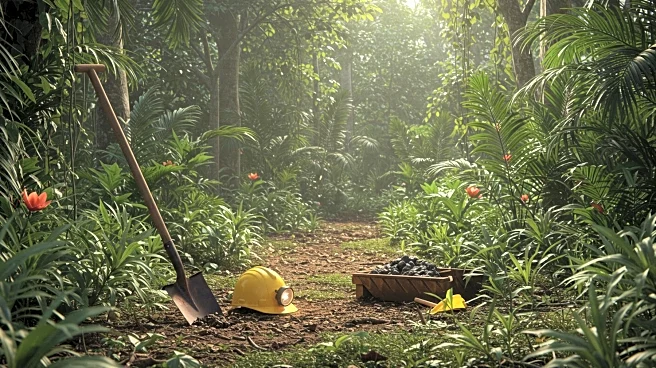What's Happening?
Brazil Potash Corp is actively pursuing financial backing to develop a potash mine in Brazil's Amazonas state. The company is in discussions with banks and lenders to secure between $1.7 billion and $1.8 billion in debt financing. The mine, located approximately 100 miles from Manaus, aims to produce 2.4 million short tons of potash annually, meeting 17% of Brazil's current potash needs by 2030. This project is crucial for Brazil, which currently imports nearly all of its potash fertilizer. Brazil Potash has already raised $280 million towards the mine's construction, which is estimated to cost $2.5 billion. The company is also negotiating with potential buyers, including agriculture company Amaggi, which has committed to purchasing 550,000 tons of potash. Brazil Potash is taking measures to minimize environmental impact, such as recycling water used in production.
Why It's Important?
The development of the potash mine is significant for Brazil's agricultural sector, which relies heavily on imported potash fertilizer. By increasing domestic production, Brazil Potash could reduce the country's dependency on foreign suppliers, potentially lowering costs and increasing supply chain stability. The project also highlights the ongoing tension between economic development and environmental preservation in the Amazon region. While Brazil Potash is implementing measures to mitigate environmental damage, the mine's construction and operation could still pose risks to the delicate ecosystem. The success of this project could set a precedent for future resource extraction initiatives in the Amazon, influencing both economic and environmental policies.
What's Next?
Brazil Potash plans to finalize contracts for the majority of its production within the next few months, securing long-term agreements with buyers. The company is also continuing discussions with various financial institutions to secure the necessary funding. As the project progresses, environmental groups and policymakers may increase scrutiny on the mine's impact, potentially leading to regulatory challenges or adjustments in operational practices. The outcome of these negotiations and the project's development will be closely watched by stakeholders in Brazil's agricultural and environmental sectors.
Beyond the Headlines
The project raises broader questions about sustainable development in ecologically sensitive areas like the Amazon. Balancing economic growth with environmental conservation is a complex challenge that requires innovative solutions and collaborative efforts from governments, businesses, and civil society. The mine's development could prompt discussions on how to responsibly manage natural resources while protecting biodiversity and indigenous communities.










